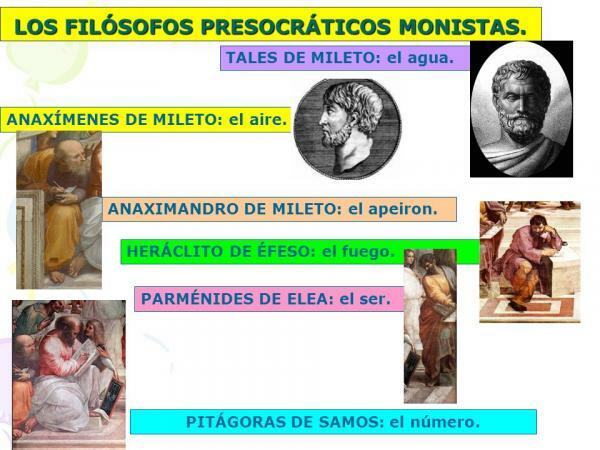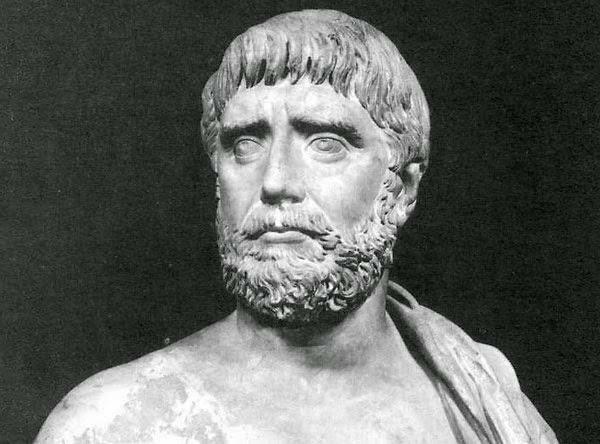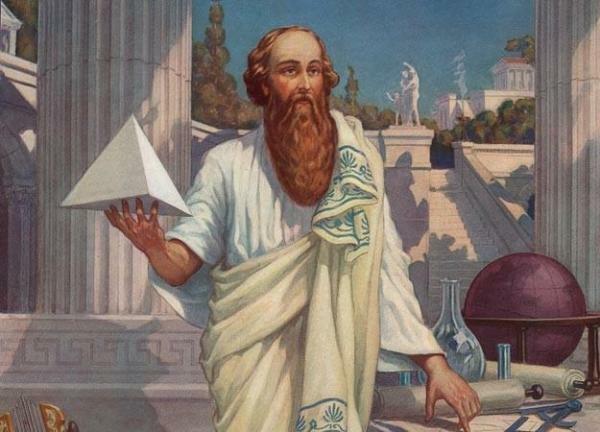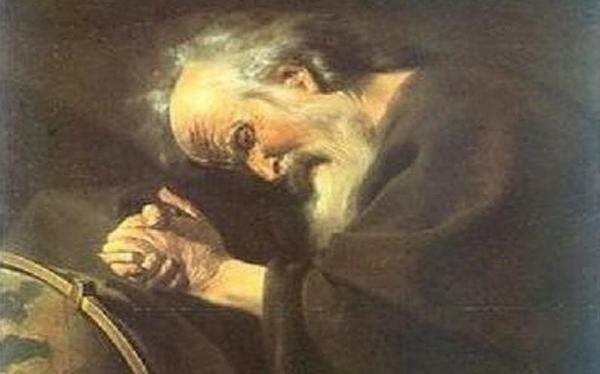The First Philosophers: Monists

Image: Pinterest
In this lesson from a TEACHER we will discover the first philosophers who are known as "monists"because they believe that there is only one single substance that is Arche. Thales of Miletus, Anaximander, Pythagoras, Heraclitus or Parmenides are some of the names that We will study below because they are responsible for the beginning of philosophical thought in the Ancient Greece.
Index
- Thales of Miletus (639-545 BC)
- Anaximander (610-547 a C)
- Pythagoras (580-524 BC)
- Heraclitus (540-470 BC)
- Parmenides (540-450 BC)
Thales of Miletus (639-545 BC)
He is the first philosopher whose name is known and the thought of him, although he did not get to write any work. Is he initiator of a philosophical school in Miletus where Anaximander and Anaximenes will stand out.
It is also the creator of the Arjé concept as the origin substance of the universe and will propose water as Arjé. We can find several reasons that justify the fact that Thales chose water as Arche.
The first would be that water is almost synonymous with life. Where there is water there is life, and life without it is impossible. Thales lived for a time in Egypt where he was able to realize the importance of water for life thanks to the rising of the Nile. Another reason could be geopolitical since Classical Greece has the Aegean Sea as its center, hence the importance of water.
Anaximander (610-547 a C)
Disciple of Thales, he considers that it is not possible that the Arche is part of this universe and therefore he considers that the Arche should be a non-existent substance in this reality. That is why he will call it Apeiron (the indeterminate). He realizes that time has a cyclical succession due to the fight of opposites: cold-heat light-dark..., and affirms that the Arche would be a reality outside of this universe where these opposites they would coexist.
At a certain moment, one of the opposites triumphs over the other creating an unfair situation, intervening Cosmic Justice to solve this injustice. Cosmic Justice will make the previously defeated opponent triumph, thus initiating the cyclical process of change that characterizes this reality. This thought will notably influence Heraclitus.
In this video of a PROFESSOR we discover the origin of philosophy.

Pythagoras (580-524 BC)
More than a philosopher, he is a leader of a religious group (the Pythagoreans) whose most important precept was the belief in the transmigration of souls. Thus, they consider that the soul is an immaterial part, united to the body, the soul being the most important part of the human being, which is capable of living outside the body, since it is immortal, the soul being a prisoner of the body.
A) Yes Pythagoras has a dual vision of the human being, dividing it into body (matter) and soul (immaterial). This idea will greatly influence Plato's thinking. But the Pythagoreans' thinking goes far beyond their theory of the soul.
They consider the number 1 to be the origin of the universe. They consider that Number 10 is perfection, but faced with the problem of finding that there were only nine heavenly bodies, and not ten as it should be, they invent a tenth planet (La Antitierra) in order to continue the coherence of the argument previous.
In order to further understand this anti-scientific methodology It must be said that the Pythagoreans hid in the rest of the philosophers the existence of irrational numbers that could contradict their vision of the universe in a mathematical and rational way. That is, when something they discovered contradicted their thinking, instead of rethinking their thinking (following the scientific method) they try, at all costs, to hide this discovery.
Ultimately, Pythagorean thought is important not because of its thought itself, but because of the importance history that it will have by influencing the thought of Plato and the New Science from the century XVI.

Heraclitus (540-470 BC)
He will consider that the universe is ruled by the confrontation of opposites, which determines that this world is a totally dynamic world. This world is so dynamic that its future is totally unpredictable, since beings are constantly changing, ceasing to be what they were, without following any type of established order.
This thought is expressed in the famous sentence: You can never bathe twice in the same river. This extreme dynamism has as an important consequence the impossibility of knowledge for two reasons:
- 1. All knowledge processes need a period of time and during this time the object changes, ceasing to be what it was.
- 2. During this period of time, the subject also changes, becoming another being.
Within this dynamism expressed in the fight of opposites we can find the influence of Anaximander's thought and it also needs the existence of a element that is in charge of making possible this fight of opposites, thus, affirms the existence of the Logos, similar to the Cosmic Justice of which he spoke Anaximander.
It affirms the existence of an Arche, which must, of course, be a dynamic element and finds it in Fire, thus, for Heraclitus, the material substance origin of the dynamic universe is fire.
Heraclitus will be one of the most important pre-Socratic authors since it will notably influence Plato, and will be one of the key elements of a polemic on movement or change, along with Parmenides, a controversy that will focus philosophical thought for about 150 years, and that will not be definitively resolved until the work of Aristotle.

Parmenides (540-450 BC)
He initiates the thought by stating Being is and Non-being is not. We must take this statement from the following point of view: Being exists and Non-being does not exist. But, as we see, Parmenides affirms the existence of a single Being that is spherical, eternal, undifferentiated, immutable and perfect. Movement (or change) is not possible since this would be the passage from Being to Non-being or from Non-being to Being, and that is totally impossible. Therefore, all change or movement is totally impossible.
But this vision of the Being has the consequence that knowledge is totally impossible, since we, if we know, we do it by differentiation, and instead the Being has no parts. We see different beings and different parts, but this is pure appearance, in reality there is only a Being, which is totally undifferentiated, without parts and therefore knowledge is entirely impossible.
This puts the philosophical terrain in a real problem since if it is affirmed, as Heraclitus does, that movement is possible, Nothing can be known, and, on the other hand, if we affirm that movement is impossible, as Parmenides affirms, neither can it be known nothing. This will be the fundamental key to overcoming the Heraclitus-Parmenides controversy: try to make compatible the three concepts of Being, Movement and Knowledge.
In fact, all subsequent authors must take this controversy into account in order to philosophize and must justify the existence of movement or change and the possibility of knowledge. This controversy will not be overcome, but until a long time later, thanks to the work of Aristotle.
If you want to read more articles similar to The First Philosophers: Monists, we recommend that you enter our category of Philosophy.



